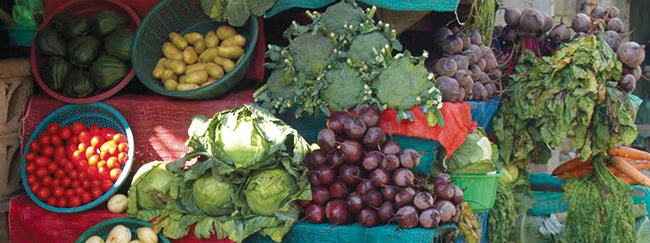
Horticulture Innovation Lab issues multiple calls for proposals
The Horticulture Innovation Lab has announced several new funding opportunities for collaborations between U.S. universities and organizations in developing countries to address needs of smallholder fruit and vegetable farmers.
U.S. university researchers
Researchers at U.S. public universities, along with their partners in developing countries, are invited to submit proposals for five-year projects that address horticultural research questions. The Horticulture Innovation Lab will fund one project in each of three topic areas:
- Horticulture and nutrition: A project with up to $2 million funding should deliver strong evidence about the impact of horticulture on nutrition and health outcomes, while increasing the capacity of research partners and institutions.
- Postharvest practices in horticulture: A project with funding up to $1.6 million shall identify impediments to adoption of improved postharvest handling practices, quantify and demonstrate the benefits of improved practices, and create a dataset for modeling the benefits of postharvest interventions with horticultural crops.
- Gender, social equity and horticulture: A project with up to $1.5 million in funding will examine women and vulnerable people who work in horticultural value chains, and then suggest steps that could improve their ability to participate in, make decisions about, or benefit from these value chains.
The deadline for full project proposals is Sept. 30. See official requests for proposals.
These three projects will be part of the Horticulture Innovation Lab’s second five-year phase, and are the largest and longest projects the program has funded since its establishment in 2009.
Organizations in developing countries
In a different call, the Horticulture Innovation Lab invites community organizations in 19 developing countries to apply for Trellis Fund grants by Sept. 15. Proposals to the Trellis Fund should identify problems faced by local farmers and ways that a U.S. graduate student could help the organization by sharing agricultural expertise. Selected organizations will be matched with a knowledgeable U.S. graduate student and provided $2,000 for a six-month project.
In its fourth round of funding, the Trellis Fund now has two tracks available for applications: a “Technical Trellis Proposal” and a “Project Development Concept Note.” Organizations that are selected by applying with a "Project Development Concept Note" will receive assistance in developing a full proposal for funding consideration, while those applying with a "Technical Trellis Proposal" will be able to move forward more quickly with their project once selected.
The Trellis Fund’s first 23 completed projects have reached 3,865 farmers, including 184 training meetings and 116 field demonstration plots.
‘Feed the Future’ focus for all projects
All of the projects will take place in countries prioritized by Feed the Future, the U.S. government’s global hunger and food security initiative. The Horticulture Innovation Lab is part of the Feed the Future initiative, with funding from the U.S. Agency for International Development and leadership from the University of California, Davis. The program’s work helps the world's poorest people break out of a persistent cycle of poverty by improving smallholder farmers’ abilities to grow and sell nutritious, high-value crops. The Horticulture Innovation Lab is one of five Feed the Future Innovation Labs led by UC Davis with funding from USAID.
Details about all of these funding opportunities are available at http://horticulture.ucdavis.edu/funding-opportunities.
The Horticulture Innovation Lab, previously called Horticulture CRSP, builds international partnerships for fruit and vegetable research that improves livelihoods in developing countries. For more information, visit http://horticulture.ucdavis.edu.
